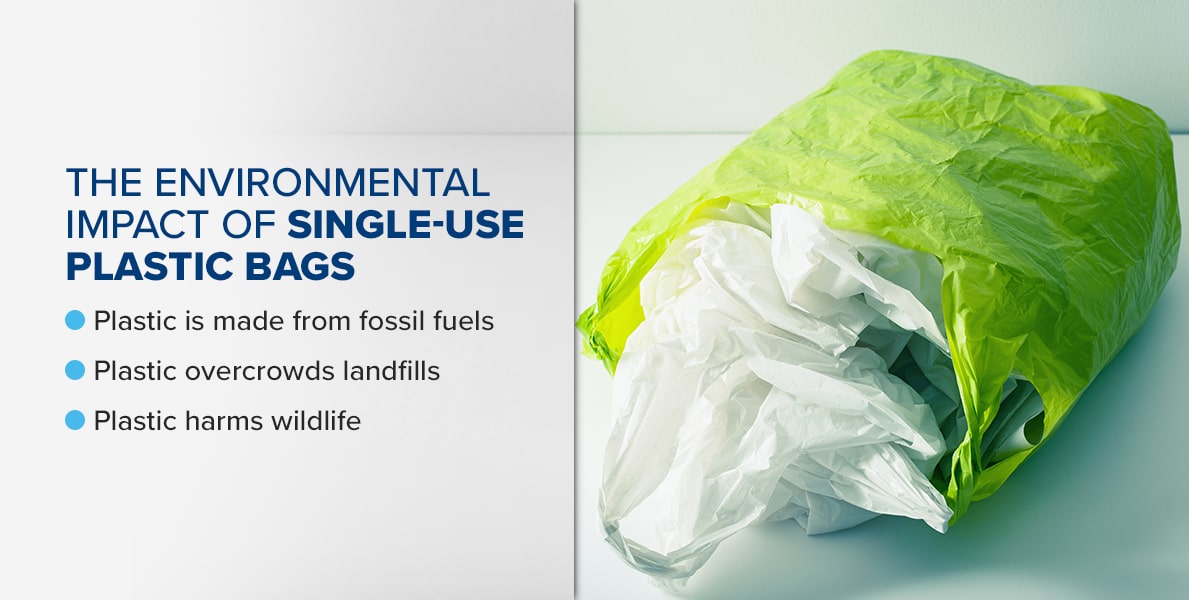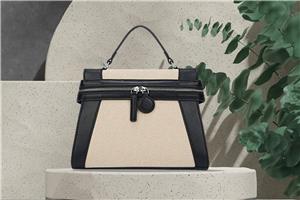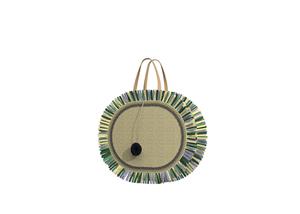Exploring Sustainable Alternatives to Plastic Bags
Exploring Sustainable Alternatives to Plastic Bags
The Environmental and Practical Shortcomings of Plastic Shopping Bags
For decades, plastic shopping bags have been a staple in retail stores worldwide. These single-use bags, made primarily from polyethylene, a type of plastic derived from fossil fuels, became popular for their cheap production cost, lightweight nature, and disposable design. However, as the global demand for convenience and mass production grew, the environmental costs of this convenience became increasingly evident. While plastic bags are easy to manufacture, their disposal process is far more problematic, and their practical limitations raise significant concerns for both consumers and environmental advocates.
First and foremost, plastic shopping bags are notorious for contributing to large-scale environmental degradation. Millions of tons of plastic waste are generated annually, with a significant portion coming from discarded shopping bags. Unlike organic materials that decompose relatively quickly, plastic bags take hundreds of years to break down into microplastics, contaminating soil, waterways, and marine ecosystems. The accumulation of these microplastics poses serious threats to wildlife, especially marine animals, which often mistake them for food, leading to ingestion, entanglement, and even death. Additionally, the production of plastic bags relies on fossil fuels, a non-renewable resource, further exacerbating global climate change through the release of greenhouse gases during extraction and processing.
From a practical standpoint, plastic shopping bags have significant functional limitations. Their thin, flimsy structure often cannot support heavy or sharp objects without tearing or stretching. This restricts their usefulness for carrying bulk items or groceries, leading to the overconsumption of bags, as consumers are forced to double or triple-bag items for stability. Furthermore, plastic bags lack versatility and long-term utility. After a single use, most bags are discarded or accumulate in households without further purpose, contributing to the ever-growing waste problem. Even in instances where they are reused, their fragile construction limits their life span. These factors point to the necessity of finding more durable, multifunctional, and eco-friendly alternatives to plastic shopping bags that can meet the needs of both consumers and the environment.
Exploring Alternatives: A Shift Toward Sustainability and Functionality
As environmental consciousness grows, so does the demand for alternatives to single-use plastic shopping bags. Consumers are now seeking eco-friendly, reusable options that fulfill not only the basic task of carrying goods but also contribute to reducing environmental impact. Several alternatives have gained popularity, each with distinct advantages, manufacturing processes, and functional characteristics. Among the most notable are knotted woven bags, canvas bags, and grass baskets.
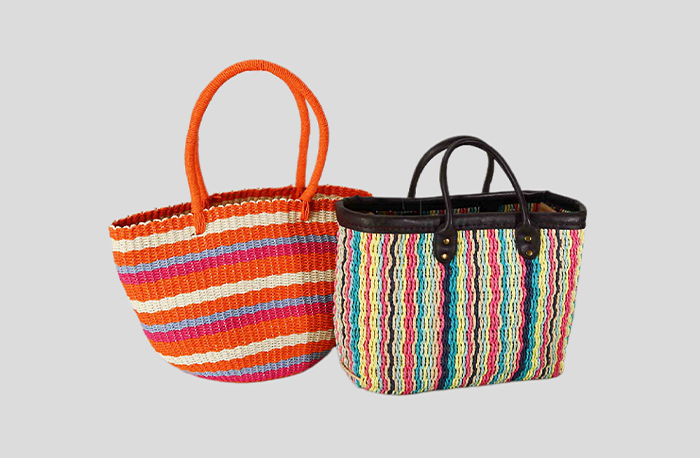
Knotted Woven Bags: Durability and Artisanal Craftsmanship
Knotted woven bags, made from materials such as paper, jute, hemp, or recycled fibers, provide a highly durable and reusable alternative to plastic bags. The production process typically involves knotting or weaving natural or recycled materials into a sturdy, flexible fabric that can support heavy loads. Jute and hemp are especially popular choices due to their natural strength, resistance to wear and tear, and biodegradability.
Production Process
Knotted woven bags are usually crafted by artisans or through small-scale manufacturing processes. The weaving technique creates a tight, durable structure that ensures the bag can be used repeatedly without losing its integrity. In addition to the durability, these bags are often made in aesthetically pleasing designs, combining traditional craftsmanship with modern functionality. This makes them not only practical for shopping but also stylish accessories that can be used in various settings, from groceries to casual outings.
Functional Characteristics and Advantages
One of the key advantages of knotted woven bags is their strength. Unlike plastic bags, which often tear under heavy loads, these bags can carry substantial weight without breaking. They are also versatile, often featuring multiple compartments or designs that allow for various uses. For instance, some woven bags are designed with specific pockets for fresh produce, allowing consumers to carry fragile items without damage. The natural breathability of the materials used also makes these bags ideal for storing fruits and vegetables, as they allow air to circulate and reduce moisture buildup.
Furthermore, knotted woven bags can last for years with proper care, significantly reducing the need for single-use alternatives. At the end of their life cycle, these bags can be composted or recycled, making them a truly eco-friendly option.
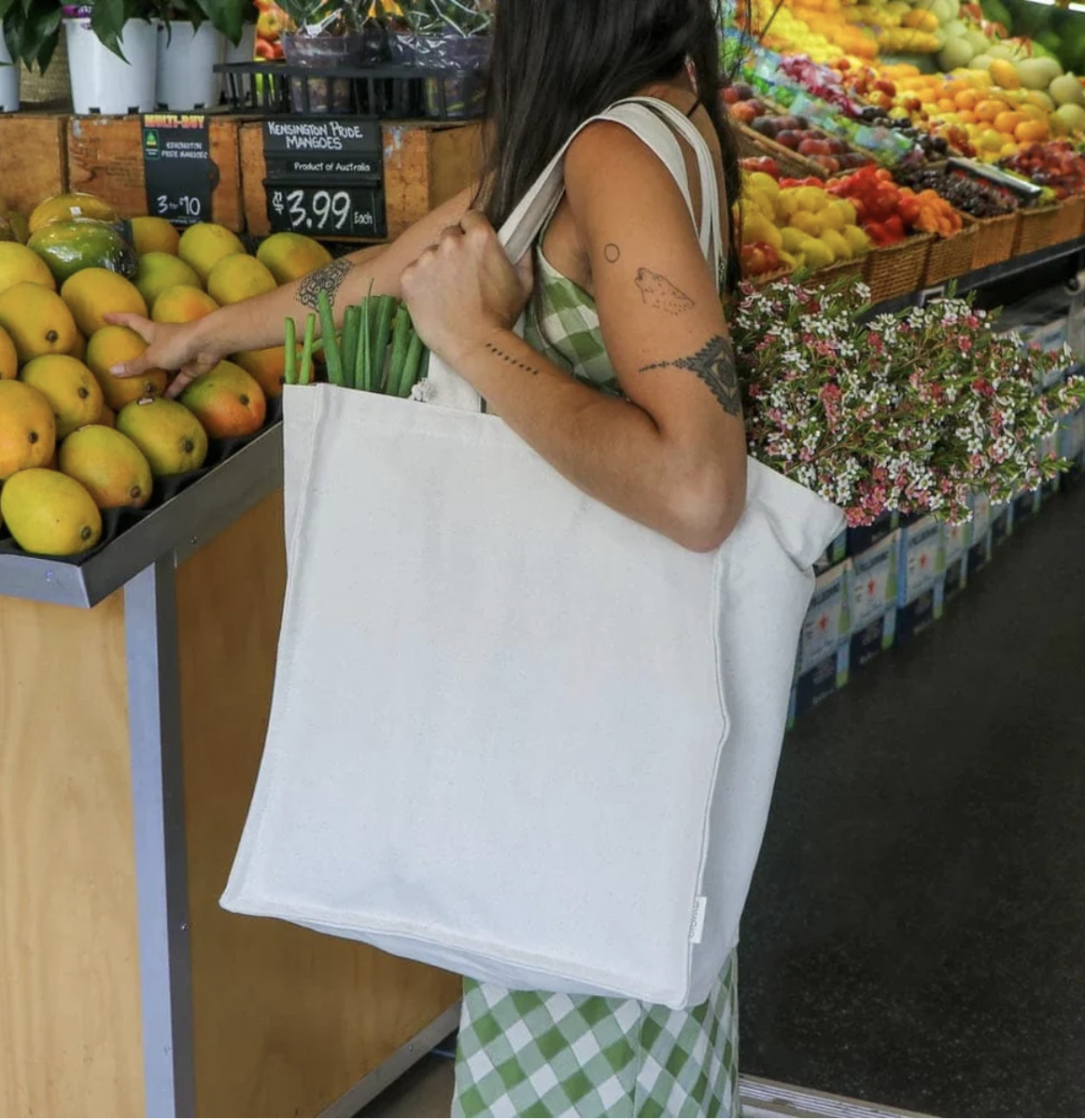
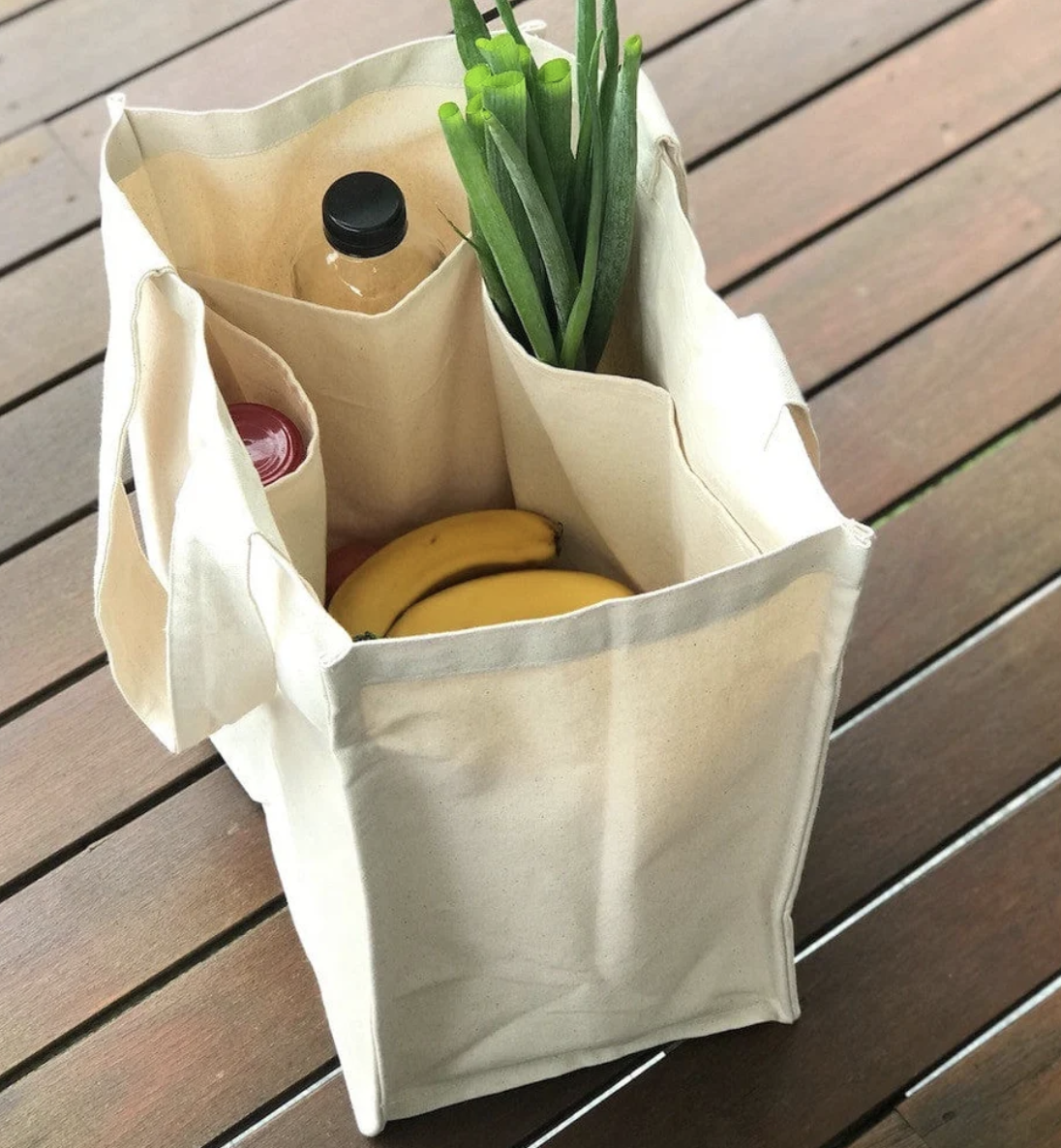
Canvas Bags: Customizable, Durable, and Versatile
Canvas bags, often made from cotton or linen, are another popular alternative to plastic shopping bags. These bags have gained widespread popularity due to their durability, versatility, and the fact that they are machine washable, making them easy to maintain and reuse.
Production Process
Canvas is a heavy-duty woven fabric that can withstand frequent use and washing without losing its shape or integrity. The production of canvas bags often involves using natural fibers such as cotton, which is biodegradable, or a blend of cotton and recycled materials. Some manufacturers also use organic cotton, which is grown without harmful pesticides and chemicals, making the production process more environmentally friendly.
Functional Characteristics and Advantages
Canvas bags offer several practical advantages. First and foremost, they are extremely durable, capable of carrying heavy items such as books, groceries, or household goods. Their strong handles and sturdy construction make them ideal for frequent use, and their capacity is often much greater than that of a typical plastic bag. Additionally, canvas bags can be easily folded and stored, making them convenient for keeping in a car or bag for spontaneous shopping trips.
One of the key selling points of canvas bags is their customizability. Many companies and individuals choose to print logos, artwork, or slogans on canvas bags, making them a popular promotional tool. This feature allows consumers to not only make an eco-friendly choice but also express their personal style or support a cause. Furthermore, since canvas bags are washable, they can be used repeatedly without concerns about hygiene.
Grass Baskets: A Traditional, Eco-Friendly Option
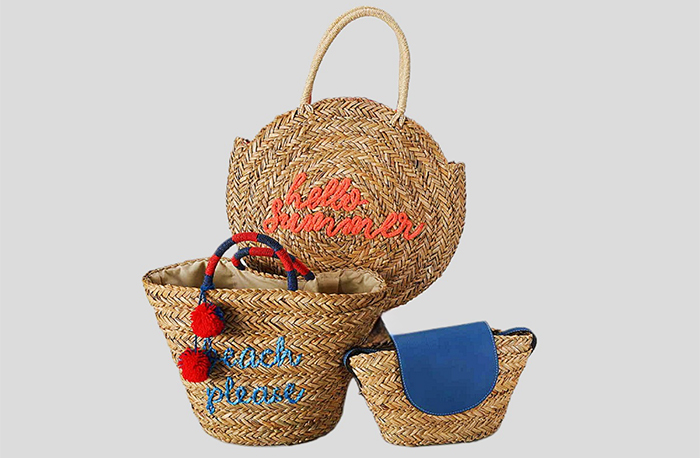 Grass baskets, often made from natural fibers such as straw, bamboo, or palm leaves, offer a biodegradable, eco-friendly alternative to plastic shopping bags. These baskets are typically handcrafted using traditional weaving techniques, making each one unique and artisanal.
Grass baskets, often made from natural fibers such as straw, bamboo, or palm leaves, offer a biodegradable, eco-friendly alternative to plastic shopping bags. These baskets are typically handcrafted using traditional weaving techniques, making each one unique and artisanal.
Production Process
The production of grass baskets involves harvesting natural fibers, drying them, and weaving them into baskets. This process is labor-intensive but results in a durable, biodegradable product. Unlike plastic bags, grass baskets are entirely natural and will decompose at the end of their life cycle, leaving no harmful residue in the environment. The weaving process often incorporates traditional patterns and designs, giving each basket a distinctive aesthetic appeal.
Functional Characteristics and Advantages
Grass baskets are known for their strength and durability. Despite being lightweight, they can carry heavy items without losing shape or integrity. Their rigid structure makes them ideal for carrying produce, as they protect delicate fruits and vegetables from being crushed. Additionally, grass baskets are breathable, which helps keep fresh produce from spoiling.
Another key advantage of grass baskets is their aesthetic appeal. Their rustic, natural look has made them popular not only as shopping bags but also as home decoration items. Many people use them for storage, gardening, or as decorative pieces, adding to their versatility. The biodegradable nature of grass baskets makes them one of the most eco-friendly options available, as they leave no lasting impact on the environment.
Reusable cloth bags
Reusable cloth bags are an eco-friendly alternative to plastic shopping bags, made from materials like cotton, hemp, or recycled synthetics. These bags offer sustainability, durability, and versatility, making them a practical choice for reducing plastic waste.
Production Process
The production process for reusable cloth bags depends on the material. Cotton, a common material, is grown, harvested, and spun into fabric. Though cotton farming requires significant water, organic cotton practices reduce environmental impact by avoiding harmful chemicals. Hemp, another eco-friendly option, requires less water and grows quickly, making it a more sustainable choice than cotton. Some cloth bags are made from recycled synthetic fibers, such as polyester or nylon, repurposing post-consumer waste like plastic bottles. This recycling process helps divert plastic waste from landfills.
Functional Characteristics and Advantages
Reusable cloth bags are durable and reusable, capable of carrying heavy items without tearing. They can be washed and reused for years, making them cost-effective and environmentally friendly by preventing single-use plastic waste. Their reusability and washable nature also ensure better hygiene, particularly when carrying groceries.
Cloth bags are highly customizable and available in various sizes and styles, such as tote bags or shoulder bags. In terms of sustainability, while cloth bags require more energy to produce initially, their long-term use offsets the environmental cost by replacing hundreds of plastic bags over time.
Conclusion: A Call for Sustainable Choices
While plastic shopping bags have long been the convenient choice for consumers, their negative environmental impact is undeniable. Their limited functionality, single-use nature, and contribution to pollution make them a poor option for long-term sustainability. Fortunately, a variety of practical, eco-friendly alternatives—knotted woven bags, canvas bags, and grass baskets—offer a way to meet the needs of consumers while protecting the environment.
As we look toward a future where sustainability is no longer optional but necessary, choosing alternatives to plastic shopping bags is a small but significant step in the right direction. Whether for grocery shopping, fashion, or home décor, these alternatives provide a way for individuals to reduce their environmental footprint while enjoying practical, long-lasting products. The time has come to move beyond the temporary convenience of plastic and embrace a future where our choices align with the well-being of the planet.

